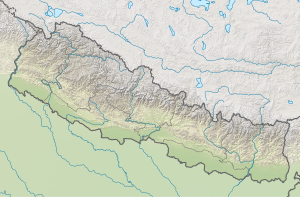Makawanpurgadhi is a Rural municipality located within the Makwanpur District of the Bagmati Province of Nepal. The rural municipality spans 148.72 square kilometres (57.42 sq mi) of area, with a total population of 25,322 according to a 2011 Nepal census.[1][2]
Makawanpurgadhi (RM)
मकवानपुरगढी गाउँपालिका | |
|---|---|
| Coordinates: 27°25′N 85°10′E / 27.42°N 85.17°E | |
| Country | |
| Province | Bagmati |
| District | Makwanpur |
| Wards | 8 |
| Established | 10 March 2017 |
| Government | |
| • Type | Rural Council |
| • Chairperson | Mr. Dorje Lama Syangtang |
| • Vice-chairperson | Mrs. Mankumari Nepali Pakhrin |
| • Term of office | (2023 - 2028) |
| Area | |
| • Total | 148.72 km2 (57.42 sq mi) |
| Population (2011) | |
| • Total | 25,322 |
| • Density | 170/km2 (440/sq mi) |
| Time zone | UTC+5:45 (Nepal Standard Time) |
| Headquarter | Makwanpurgadhi |
| Website | makawanpurgadhimun |
On March 10, 2017, the Government of Nepal restructured the local level bodies into 753 new local level structures.[3][4] The previous Makwanpurgadhi, Ambhanjyang, Sukaura and Budhichaur VDCs were merged to form Makawanpurgadhi Rural Municipality. Makawanpurgadhi is divided into 8 wards, with Makwanpurgadhi VDC declared the administrative center of the rural municipality.
Demographics
editAt the time of the 2011 Nepal census, Makawanpurgadhi Rural Municipality had a population of 25,379. Of these, 58.7% spoke Tamang, 39.3% Nepali, 1.1% Magar, 0.4% Newar, 0.1% Gurung, 0.1% Maithili and 0.1% other languages as their first language.[5]
In terms of ethnicity/caste, 59.4% were Tamang, 26.1% Hill Brahmin, 7.0% Chhetri, 2.3% Kami, 2.2% Magar, 1.4% Newar, 0.8% Damai/Dholi, 0.2% Gurung, 0.1% Chepang/Praja, 0.1% Sanyasi/Dasnami, 0.1% Sunuwar, 0.1% other Terai, 0.1% Thakuri and 0.2% others.[6]
In terms of religion, 56.4% were Buddhist, 41.1% Hindu, 1.9% Christian and 0.6% others.[7]
In terms of literacy, 69.1% could read and write, 2.5% could only read and 28.3% could neither read nor write.[8]
References
edit- ^ "District Corrected Last for RAJAPATRA" (PDF). www.mofald.gov.np. Retrieved 17 July 2018.
- ^ "स्थानीय तहहरुको विवरण" [Details of the local level bodies]. www.mofald.gov.np/en (in Nepali). Ministry of Federal Affairs and Local Development. Retrieved 17 July 2018.
- ^ "New local level structure comes into effect from today". www.thehimalayantimes.com. The Himalayan Times. 10 March 2017. Retrieved 17 July 2018.
- ^ "New local level units come into existence". www.kathmandupost.ekantipur.com. 11 March 2017. Retrieved 18 July 2018.
- ^ NepalMap Language
- ^ NepalMap Caste
- ^ NepalMap Religion
- ^ NepalMap Literacy
External links
edit

